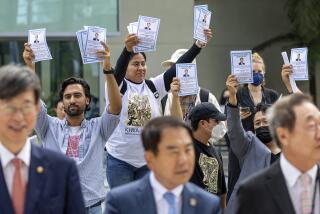Capitalism vs. Moralism in Burma
- Share via
Viewed solely from a public-relations standpoint, Unocal’s pipeline project in repressive Burma is about as close to one gigantic image disaster as any $1.2-billion investment can get for an American oil company that cares about what people think of it. On today’s worldwide human rights radar screen, the military junta in Burma has attained a special place in Western human rights contempt. Thus Unocal, with headquarters in Los Angeles, is now hearing it from liberal boo-birds and human-righters from all over.
It has even been sued in a U.S. court for various alleged transgressions against international human rights treaties. If it weren’t for the enormous stakes involved, Unocal President John F. Imle Jr. might be well tempted to pull the plug on its investment in Burma, officially called Myanmar, as have other PR-burned Western companies, including Heineken, Carlsberg and Levi Strauss, on theirs. Though Unocal shares the project with the French giant Total, the local Myanma Oil & Gas Enterprise and PTT Exploration and Production of Thailand, the quarrel right now is solely with Unocal. And if all the charges against it--bedding down with a murderous regime, carelessness with the environment, labor abuses and forced relocations--sound familiar, that’s because they’re strikingly similar to the charges that were laid against Shell Oil’s controversial project in Nigeria. But Unocal appears to have learned many lessons from that ugly venture, which culminated in the death of that African country’s leading human rights activist. And any fair examination of the list of particulars against shellshocked Unocal reveals too many of the facts to be in considerable dispute for almost any of them to be taken for granted. Indeed, from Unocal’s perspective, an offer to finance an impartial fact-finding panel might take the exercise of corporate due diligence to new and welcome heights, even if this exceptionally nasty Burmese regime, absurdly named the State Law and Order Restoration Council, were to veto the whole idea.
Unocal has exercised a good-faith effort to see that workers are compensated in fact as well as intent. Additionally, the very presence of American companies, grounded in American traditions, pressured by the human rights expectations of the U.S. public and monitored by the Western media, probably works as a speed bump to slow down SLORC. But we can’t hold American companies involved in countries with rough-cut governments responsible for things they can’t control. Why blame Unocal for all that is wrong in Burma? The oil giant, after all, didn’t put these brutes in power.
The American yearning for virtue in all things is matched only by our penchant for inconsistency in many things. For instance, even though Vietnam remains a repressive communist state, U.S. policy now promotes diplomatic exchanges and U.S. business investment there. China continues to fail one Western human rights test after another but we emphasize the hoped-for seductiveness of constructive engagement rather than the cold tonic of diplomatic and economic isolation.
Moreover, isolation doesn’t always do the trick: Eventually it did dislodge the white racists in South Africa, but Fidel Castro continues to puff along in Cuba. Thus, however emotionally unsatisfying, hardheaded pragmatism is necessary in a world that almost unanimously rejects the U.S. moralizing that it views as a scarcely veiled exercise in cultural imperialism. Asian countries want to do business with Burma and want the U.S. to spurn any economic-boycott grandstanding.
But because Burma leads the evil-empire league at the moment, Unocal becomes the cause celebre of the year in the U.S. Too bad. In reality, the company’s complicated project will bring natural gas to Thailand from offshore Burma, thus providing a clean source of energy to a region suffering, as is almost all of Asia, from pervasive pollution.
Don’t get me wrong: The last time I shed tears for an oil company, I rooted for the Notre Dame football team. And if Unocal can ride out the current storm of protest and complete the project as planned by 1998, it will make a fortune for the company’s coffers and shareholders. But note this, friends, SLORC critics and human rights countrymen: That is neither illegal nor immoral and in important respects is highly desirable. Third World development will not happen unless outside capital finds the risk profitable.
For Americans, the overriding moral question is what the Unocal project means for the oppressed people of Burma, who would appear to have no way out of their giant national prison. It’s hard to believe that, on the whole, Western investment hurts the people there more than it helps. And it’s ridiculous to take the view that Western firms necessarily exploit unemployed people simply by giving them jobs, and, in Unocal’s case, by providing medical care and other benefits. In Burma as in many other Asian societies, people work or they die; there is no welfare net to support them.
Unocal so far has had more than 1,000 Burmese on its pipeline payroll. If human rights organizations get their wish and Western investment continues to run away, the Burmese people could wind up in far worse shape. Relatively speaking, foreign investment and economic development in Burma has been very limited. There needs to be more of it, not less. A guilt-ridden exit by the West could well mean no exit, at least in the foreseeable future, for the people of Burma.
More to Read
Sign up for Essential California
The most important California stories and recommendations in your inbox every morning.
You may occasionally receive promotional content from the Los Angeles Times.










